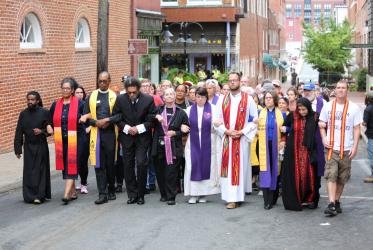The 1968 Poor People’s Campaign, the nascent movement for economic justice that Martin Luther King Jr. began just before his death, has been revived and relaunched in the US at a time of heightened racial tensions and political upheaval.
The development was welcomed this week by the WCC’s central committee, which noted the confluence of the new movement with the WCC’s own work and the recent initiative of the National Council of Churches in the USA, entitled “A.C.T. Now: United to End Racism,” launched last March in Washington, D.C.
“As we journey together on the Pilgrimage of Justice and Peace celebrating the 70th Anniversary of the WCC, we walk alongside our brothers and sisters in the US who face similar injustices today as were criticized by Rev. Dr King 50 years ago,” the statement affirmed.
As did King, organizers of the new Poor People’s Campaign: A National Call for Moral Revival” recognize the interconnected character of several injustices—not just racism, and not just economic inequality, but also the war economy, ecological devastation, and an underlying distorted morality.
After several weeks of nonviolent actions taken in different US states, the campaign plans to converge on Washington, D.C., on 23 June for a march and rally there.
King was slated to speak at the 1968 WCC assembly in Uppsala but was killed in April of that year. The assembly marked a turning point in the focus and energy of the ecumenical movement, noting that “renewal must begin in the local community, by detecting and dethroning all exclusiveness of race and class and by fighting all economic, political and social degradation and exploration of men.”
Fifty years on, it is an approach, and a promise, that the new campaign aims to fulfill.








